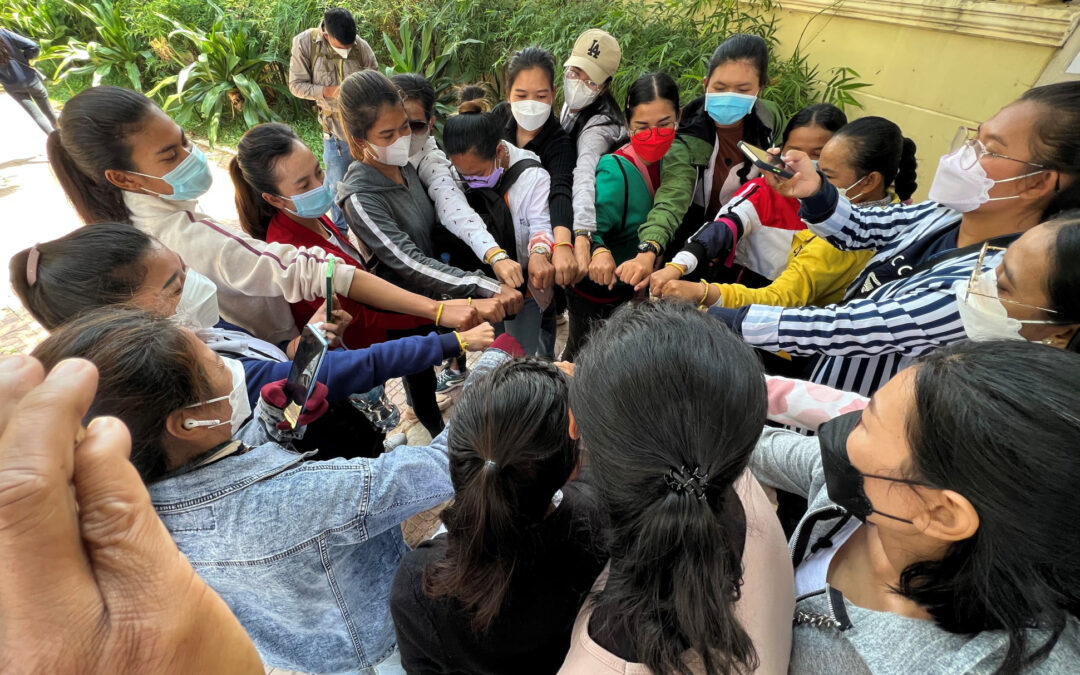
Jan 24, 2022
Striking workers at NagaWorld hotel and casino complex in Phnom Penh, Cambodia, petitioned several embassies and consulates this week asking them to contact the government about the arrests of union leaders and urge officials to respect human rights.
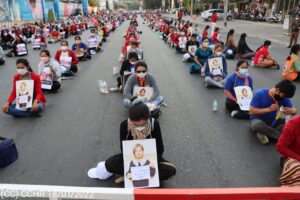
Credit: CCHR
During a police raid on union offices December 31, nine union leaders were arrested and computers and phones seized. Four days later, union president Sithar Chhim was violently taken away by plain clothes police while attempting to join her colleagues on the picket line. Chhim and the other union leaders at the Labor Rights Supported Union of Khmer Employees of NagaWorld union (LRSU) are charged with incitement, which carries a sentence of up to five years in prison.
(Send a message to the Cambodian prime minister asking for union leaders’ immediate release.)
An additional 15 striking workers were arrested January 3 as they peacefully walked the picket line. Thousands of slot machine workers, dealers, housekeepers and technicians have been on strike for more than a month, demanding the reinstatement of 365 employees who were fired in April. While management asserts the layoffs were due to COVID-19, union leaders say those laid off were all union leaders and activists. Chhim and eight other union activists are being held in two separate detention centers under a 21-day quarantine, and so denied any visitors, including their lawyers.
“It is obvious that the company wishes to destroy the union,” Chhim said late last year.
The layoffs took place shortly after the union won a wage increase that boosted pay between 18 percent and 30 percent and secured the reinstatement of Chhim, who was suspended from her job in September 2019 for defending the right of a union member to wear a shirt with a message that called for higher wages. Chhim has worked at NagaWorld since 2007.
Global Condemnation of Arrests
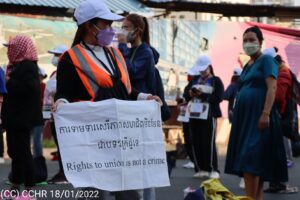
Credit: CCHR
Civil society groups have noted that the Ministry of Labor has not addressed worker reinstatement, the workers’ foremost demand. Union leaders called a strike for December 18 after management refused to talk with the union for weeks and remained silent during mediation meetings with the Ministry of Labor.
Officials at the United Nations, the International Labor Organization (ILO) and global human rights organizations have condemned the arrests, with ILO Director General Guy Ryder calling for their immediate release. “Arrests and imprisonment in connection with peaceful strike action constitute a serious interference with civil liberties in general and trade union rights in particular,” Ryder says in a letter to the Cambodian prime minister.
In 2020, the International Trade Union Confederation assigned Cambodia its second lowest rating in its annual Global Rights Index, indicating the country offers “no guarantee of rights” to forming unions, peacefully assembling, striking or collectively bargaining.
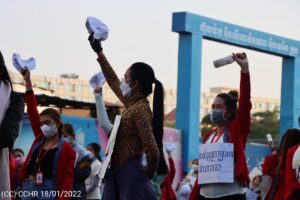
Credit: CCHR
Union leaders say NagaWorld has a long pattern of anti-union actions in Cambodia that began as early as 2010 when the global food, hospitality and service workers union IUF filed its first complaint to the ILO Committee on Freedom of Association regarding the unfair termination of 14 union leaders and members. The company’s repeated attempts to deny worker rights include lax safety and health protocols, with workers saying the company in 2021 ignored their calls for safety measures to protect employees from contracting COVID-19 and for transparency in reporting outbreaks.
NagaCorp, a five-hotel resort and casino, has an exclusive, multidecade license to operate in Phnom Penh and despite pandemic lockdowns, reported substantial profits in 2019 and 2020.
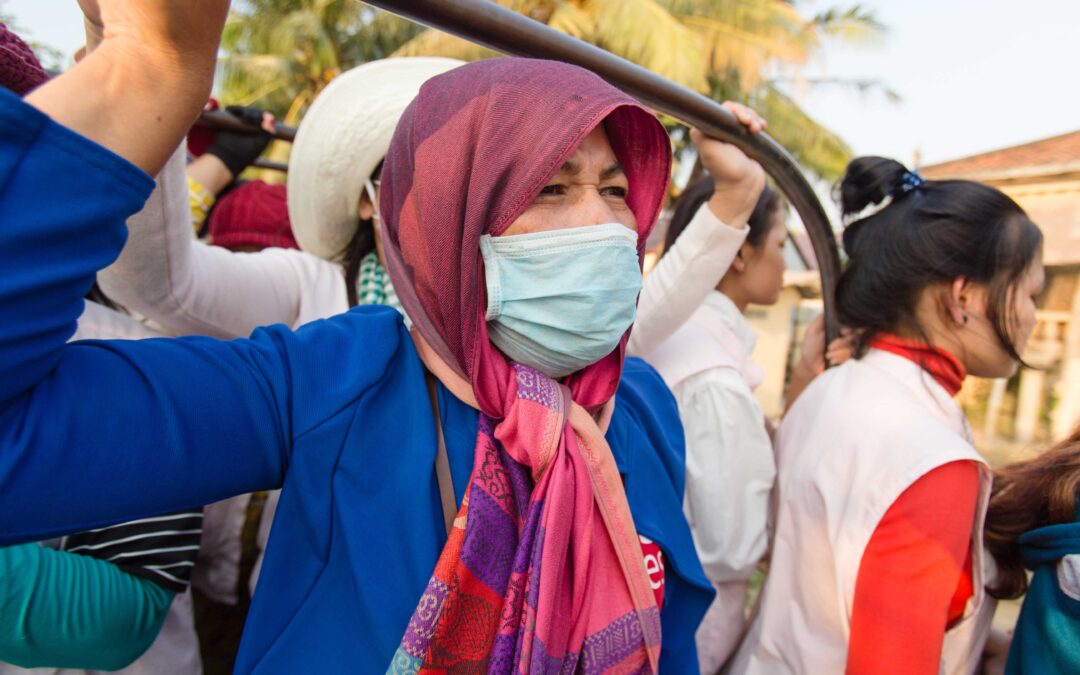
Jun 1, 2021
Half or more workers in key Cambodian industries were suspended for three or four months, and most were unable to support themselves on government aid during the pandemic, according to a new study that put hard data to the suffering of the country’s low-wage workers.
Some 53 percent of those working in tourism were suspended for an average 15 weeks, and 40 percent of workers in Cambodia’s garment and footwear industries were suspended for an average of 11 weeks, according to a survey of 1,525 workers by the Center for Policy Studies. Solidarity Center and The Asia Foundation supported the research, which reports results from July and August 2020. (See the full survey.)
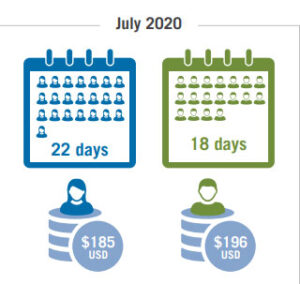
Women workers in Cambodia worked more and were still paid less than men during the pandemic. Source: CPS/Solidarity Center/Ponlok Chomnes
Women comprise the majority of workers surveyed and are the majority of 800,000 workers in the country’s garment and footwear industries. Before the pandemic, women were typically paid less than men. Yet, even when they returned to work in July 2020, they reported being paid less than men even though they worked more days than men.
All workers who returned to the job by July 2020 on average were employed for fewer hours and earned less than in July 2019.
COVID-19 an Excuse to Exploit Workers
Although many businesses were forced to temporarily suspend operations or shutter permanently during Cambodia’s first wave of COVID-19, some employers took advantage of the pandemic to lay off workers, union leaders say.
Further, hospitality and garment workers who returned to, or remained on the job, were not provided adequate personal protective equipment (PPE) or measures to ensure their safety, according to union leaders in Cambodia. Unions have been organizing to hold employers to account, negotiating for better protection measures.
Government Support Helpful, Not Sufficient
To assist garment and tourism workers during the country’s first wave of COVID-19, the Cambodian government launched several programs, including financial support for workers suspended from the job and a skills improvement training program. But workers interviewed for the survey said the suspension payments, which ranged $40 to $70 per month, were not sufficient to cover the roughly $69 they needed for basic monthly food expenditures.
Half of those surveyed say the suspension allowance was their only income, and more than 50 percent said they could not afford to send remittances to their family as a result of pandemic-related losses. Between 40 percent and 60 percent of workers surveyed say they took on debt to survive.
The government announced in July 2020 that businesses closed during COVID-19 were not required to pay workers hardship or layoff wages. Tourism sector operations also were not required to contribute the $30 per month toward the suspension payments. The government provided $40 per month.
Urgent Action Needed for New Pandemic Wave
Since February, Cambodia has experienced its worst COVID-19 outbreak, which has led to a deepening crisis for workers as many major cities and several provinces have been in strict lockdown.
During the pandemic, workers in many industries have been left out of public social protection programs, such as health coverage, and the survey recommends extension of these benefits for the most vulnerable.
The survey also recommends expanding skills improvement training programs and funding opportunities for temporary jobs.
Without such support, garment workers like Eang Malea are returning to their factories despite the risk of contracting COVID-19.
“I need to pay rent, utilities and debts, ” Malea, 26, said. “I worry that I will get infected by going to work without being vaccinated, but I don’t really have a choice.”
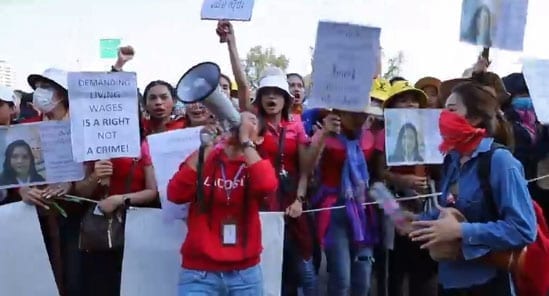
Jan 14, 2020
Thousands of casino workers at NagaWorld hotel and casino complex in Phnom Penh, Cambodia, won a wage increase that boosts pay between 18 percent and 30 percent and secured the reinstatement of union president Sithar Chhim, who was suspended from her job in September for defending the right of a union member to wear a shirt with a message that called for higher wages. The agreement also provides a $200 incentive for workers without health insurance and a bonus equal to roughly two months’ salary, says Chhim.
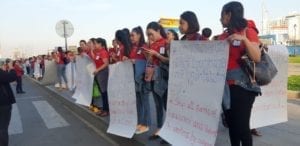
Credit: Solidarity Center
Some 5,000 of the 8,000 workers—including dealers, slot machine workers, housekeepers and technicians—struck the casino January 9, and more than 4,000 rallied outside the complex for two days with signs saying “Demanding living wages is a right, not a crime!” and holding placards with photos of Chhim seeking her reinstatement. Chhim, a game floor supervisor, is branch president for the Khmer Employees’ Labor Rights Support Union of NagaWorld.
NagaCorp, a five-hotel resort and casino, has an exclusive, multidecade license to operate in Phnom Penh and reported an estimated $1.8 billion in revenue last year, up from $1.5 billion in 2018. Yet housekeepers are paid $191 per month.
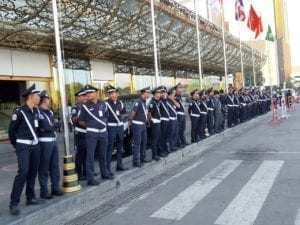
Police at NagaWorld hotel and casino as workers rallied outside. Credit: Solidarity Center
In May, nearly all 4,000 union members signed a petition demanding a wage increase, and the union began negotiations with the employer in June. When the company did not return to the bargaining table after three months as it indicated it would, more than 1,500 union members met September 19 and agreed to wear T-shirts with a message highlighting the company’s profits and expressing workers’ need for a wage that pays their rent, food, transportation and other basic monthly expenses.
The next day, Chhim was detained for hours at the facility and suspended. Union members immediately walked out in support of her. Sithar told Equal Times she then urged her colleagues to continue to work as usual, while organizing subtle protest actions, which included union members wearing pink face masks, black armbands and other markers of solidarity as they enter and exit the tightly guarded checkpoints of the complex.
After the union provided legal notice of the strike, the company continued hiring new workers, providing them accommodation and food in the company’s building and prohibiting them from leaving the facilities or contacting their families, according to the union.
Challenging Environment for Workers
The casino workers’ victory is all the more notable because of the many recent challenges to worker wrights in Cambodia.
Union leaders say amendments to 10 articles in Cambodia’s Law on Trade Unions restrict fundamental union activities. For instance, one amendment deprives unions of their right to hold legal strikes. “[Holding] a legal strike is always difficult, and I think the barriers in the Trade Union Law have actually made it more difficult,” says William Conklin, Solidarity Center Cambodia country director.
Cambodia’s labor rights are currently under intense scrutiny, as the European Union decides whether to rescind the nation’s preferential trade status that grants Cambodian exports duty-free access into EU markets.
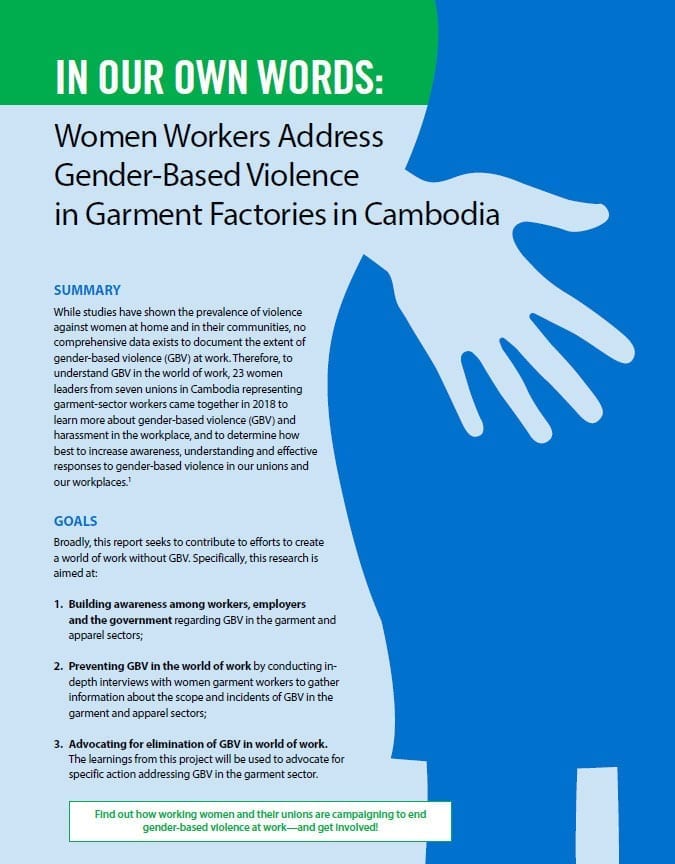
Jun 5, 2019
While studies have shown the prevalence of violence against women at home and in their communities, no comprehensive data exists to document the extent of gender-based violence (GBV) at work. To better understand GBV at work, 23 activists and female leaders of workers in seven Cambodian unions talked with garment workers. Here are their findings.
Download here.
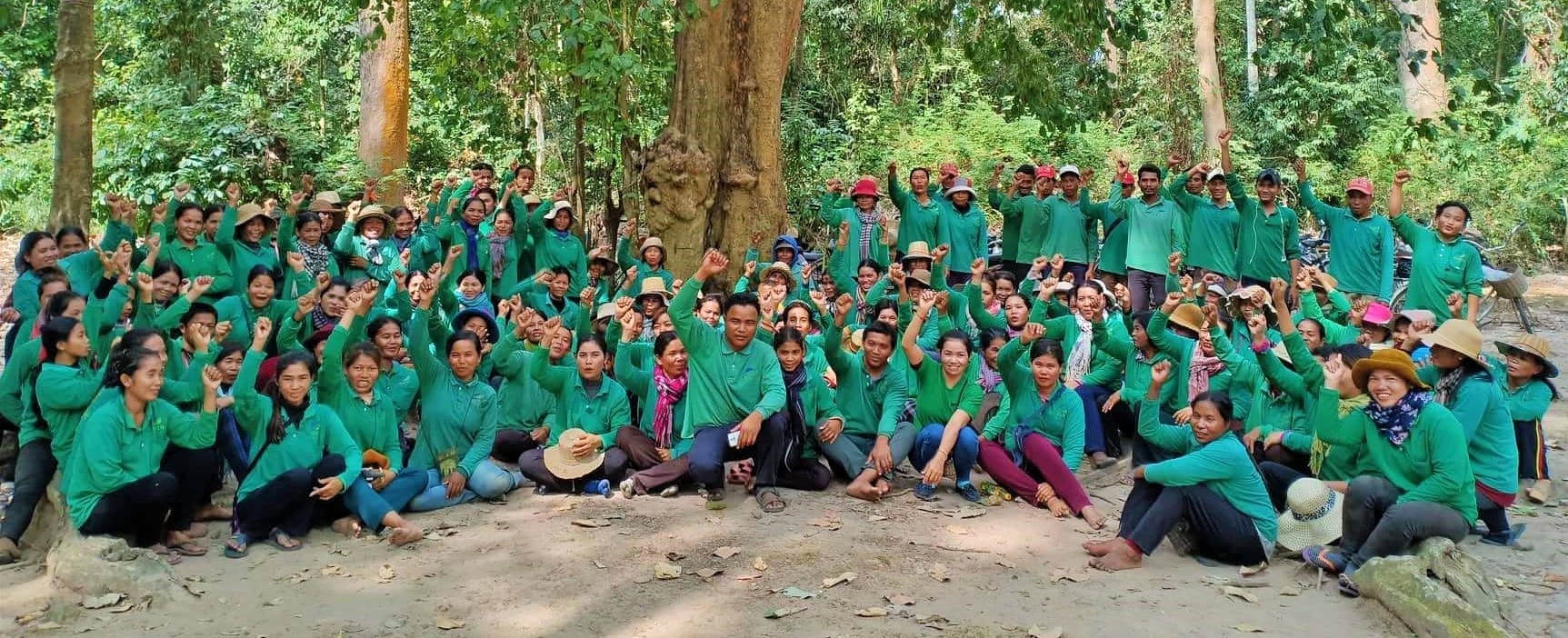
Jan 18, 2019
At Cambodia’s iconic Angkor Archaeological Park in Siem Reap, trash collectors employed by the contractor V-Green are back on the job with a boost in pay this week after 200 workers waged weeks-long lunchtime protests for better wages, safer working conditions and improved social protections like health care.
The company agreed to increase monthly wages by $15 in 2019 and $20 in 2020, which means “workers with the lowest wage could earn up to $120 [per month] next year,” local union president Tea Tuot told the Phnom Penh Post. The workers, most of whom are women, also will get a $25 per month pay boost if the agency governing the park renews the company’s contract in 2020, and additional increases in the following two years.
Tea, who says the company reassigned him to a worksite far from the union members, was returned to his previous position as part of the agreement.
After workers formed the Tourism Employees Union V-Green Co. (TEUVGC) in June 2018, they successfully pushed for a monthly wage increase from $71 to $80 and some social protections through the national social security system, including access to the national health care program and worker compensation benefits.
But further talks stalled late last year, and workers say the company began to retaliate against union activists, including Tea. The company has agreed to not impede union activity or retaliate against workers involved in the union.
Throughout the workers’ efforts to achieve justice on the job, the Solidarity Center provided the union, an affiliate of the Cambodian Tourism and Service Worker Federation (CTSWF), with legal and bargaining support.
Workers Don’t Share in Cambodia’s Booming Tourism Industry
Cambodia’s tourism sector earned $3.63 billion in revenue in 2017, an increase of 13.3 percent over the previous year. Yet workers collecting trash throughout the more than 400-acre site are not provided with protective gloves and face masks, exposing them to safety and health hazards like broken glass and hazardous chemicals. They also have little job security and were not paid overtime on Sundays and holidays as required by law.
In recent years, construction and restoration workers at the Siem Reap complexes also have sought to improve their poverty wages and highly dangerous working conditions, but like many workers in Cambodia, they face big hurdles when they seek to form unions and improve their working conditions, including retaliation, violence and even imprisonment, according to the International Trade Union Confederation (ITUC).
Cambodian workers have waged few strikes in recent years since passage of a 2016 labor law that significantly limits workers’ freedom to form unions and exercise their rights to collective bargaining and free assembly, and workers celebrating their victory at V-Green hope their victory bolsters’ similar workers’ struggles around the country.











